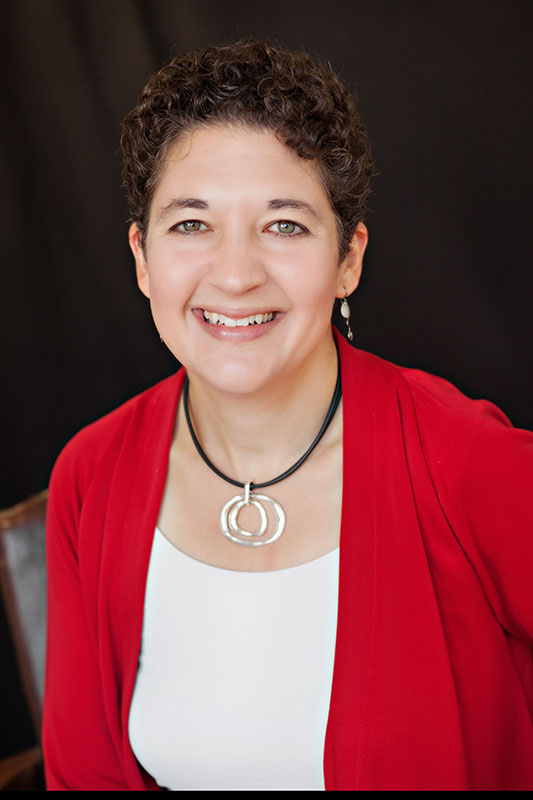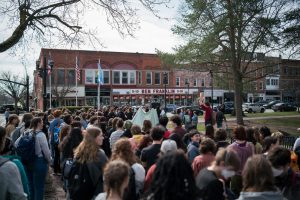Off the Cuff: Renee Romano, professor of History, Africana Studies, and Comparative American Studies
Renee Romano, professor of History, Africana Studies and Comparative American Stud- ies and affiliate of the Gender, Sexuality and Feminist Studies Institute, who discussed the Eric Garner and Mike Brown cases on the NPR program “The Takeaway” last week
December 12, 2014
Renee Romano, professor of History, Africana Studies and Comparative American Studies and affiliate of the Gender, Sexuality and Feminist Studies Institute, recently released an article in The American Historian titled “Beyond ‘Self-Congratulatory Celebration’: Complicating Civil Rights Anniversaries.” Romano sat down with the Review to discuss the historical narrative of race and systematic violence in America.
What does it mean to “complicate” civil rights anniversaries?
It means that many civil rights anniversaries that we celebrate and recognize are part of a simplistic and misleading story that suggests that we should celebrate the movement as something that was fully successful, that solved our issues, that really explains that we made great progress, that we have moved far beyond [all] the issues that we have ever faced in the country in terms of race. So by complicating them, I mean recognizing them.
Civil rights anniversaries should not simply be an occasion for a pat on the back or for some kind of nostalgic self-celebration, but this should really be a space to think about our history. We need to complicate that narrative of “we have overcome everything,” which, in the [Faculty and Student Teach-in on Ferguson], I called the “civic mythology of racial progress” that concludes that we have solved our problems. Civil rights anniversaries can be part of that process, but often it’s reinforced — the celebration is reinforced — that kind of … narrative of “Rosa Parks came, she sat down, and now we have overcome.”
Could you speak a little more about the civic mythology of racial progress? How similar is the U.S. today to the U.S. during the civil rights era?
The civic mythology of racial progress is essentially the idea that we have, for the most part, overcome our racial issues. It frames racism as a story. Another way to put it is the embrace of colorblindness, the idea that we have been colorblind — we do not see color. It frames racism as the aberrant act of particularly bigoted individuals. [The view is that] a Klu Klux Klan member is racist. So in the ’60s and ’70s, the civil rights era, there were people who were very opposed to any kind of change in the status quo, and they were not particularly shy about saying black people are inferior. “We don’t want to go to school with them” and “White people are better” and all
those kinds of things — the standing outside with signs that say “Race Mixing Is Wrong,” and those weren’t the words they used. That is something that was pretty common in the resistance to the movement.
What’s happened in part is that we’ve moved beyond a lot of that racist language. It seems like a really good thing that we don’t have that overt racist language anymore, [that it is no longer] publicly acceptable, that it is a problem when someone uses overt racist language. We’ve also passed a series of laws that make it illegal for there to be overt — supposedly illegal for there to be overt — discrimination under the law.
So [the U.S. passed] the 1964 Civil Rights Act, the 1965 Voting Rights Act, but in the aftermath of those laws and their passage, what we see is the emergence of a new racial ideology. It’s a new racial ideology that, when applying to historians [and] political theorists, is usually referred to as “colorblindness.” Essentially, it’s a racial ideology that upholds racial inequalities by refusing to recognize — refusing to acknowledge — the continuing daily importance and power of race to Americans.
So in the 1960s, [legislators] passed these laws, and the ideology of colorblindness really portrayed the rupture. We passed laws, then we’re done. The truth is, those laws, while important, have been, one, never as radical as they could have been, and two, they have been very much contained — their potential has been contained primarily by court rulings. … They’ve become less powerful since the mid-’70s [and] ’80s than they were in the mid-’60s. So that means to say that we have these laws that have done everything we need to do is really problematic, and it ignores [not only] both the legacies of the histories of inequalities and second-class citizenship that was imposed on people, but also the ways in which contemporary structure continue[s] to privilege certain people over others. That makes that very difficult for people to recognize and to acknowledge [and] to even understand the way in which race continues to structure society.
More specifically, how does understanding and knowing this history apply to recent examples of systematic violence, such as the Michael Brown and Eric Garner cases?
Well, I think if you know and understand the history, it’s pretty easy to recognize that these examples of systemic violence are, in fact, systemic. That’s one of the key differences. Do you frame these acts as individual
Renee Romano, professor of History, Africana Studies and Comparative American Studies and affiliate of the Gender, Sexuality and Feminist Studies Institute, who discussed the Eric Garner and Mike Brown cases on the NPR program “The Takeaway” last week
[acts in which] the cops shouldn’t be accountable, or do you frame them as part of a larger structure and system that reflects ideologies that don’t place much value on black life or accept the idea that black men usually are dangerous threats? Even understanding the history helps one to see it as systemic rather than as individual acts that only need to be dealt with at an individual level, if at all.
This police officer felt in danger, therefore we can excuse what he did, and that’s not the conversation we need to be having in [this] country. But without understanding the history, it is very easy for that to be the conversation. I hope we can get a broader understanding so we can begin to think about the patterns. These recent killings are not aberrations, nor are they new. They reflect the continuity from the past, not a radical move. It’s not something new, and that’s problematic — that we have not changed in that way. … It’s still endemic in our society, and we need to address it. We need to address it as a systemic [issue], not just an issue of a certain few people.
How could this history inform the responses to these events and the goals moving forward?
I would like to see a recognition — talking nationally — that there’s really a problem [and that] racial inequality remains and is
really problematic. African-Americans and other people of color have a different experience in this country than many white people. They very rightfully have fears of police, which is not a reaction that all whites can really relate to. [White people] have the privilege of ignorance. That needs to be a starting point. … I think there needs to be a lot of levels. One level would be what can be done about this kind of police violence and obviously holding people accountable, but holding people accountable in a way that makes clear that these kind[s] of police practices are unacceptable and that they are not things that can be condoned. Pulling guns on folks without any sense of real threat [is an example]. All of this has to change. We need prosecutors who actually really follow and try to talk to people. We need to rein in police.
But we need more than this. … How do we undermine that ideological association, that stereotype? How do we find equal opportunity so black people can find ways to live up to their full potential in this society? The conversation about how to change police practices is a starting point; it’s a really important one, and I hope we can move that conversation forward. … What kind of society do we want? Do we want a society where the police act this way? But also, then it needs to go deeper. In the longer run, we look at the incarceration of black men — the higher rates of incarceration. We are wasting so much potential. You know, [we have] schooling where kids are not given much of an opportunity to learn — the school-to-prison pipeline. … There’s a number of folks in this country who are not nurtured to be able to live up to their full potential no matter what class they’re born in, no matter what they look like, no matter where they come from, [which] is staggering, and that’s got to change because it’s just everybody’s issue. It should be everybody’s issue because it is such a waste of human life.
It’s also just immoral and wrong for a society to devalue a segment of your population. … I’m hoping that we could eventually, as a country, get some of those conversations [going]. I think [we should be] starting with [the question], “How do we not only hold police accountable, but change the cultures by which policing is taking place through a civilian review board, through different types of practices and training?” I don’t just want these murders to be a [case in a courtroom]; I want them to stop happening permanently.


























